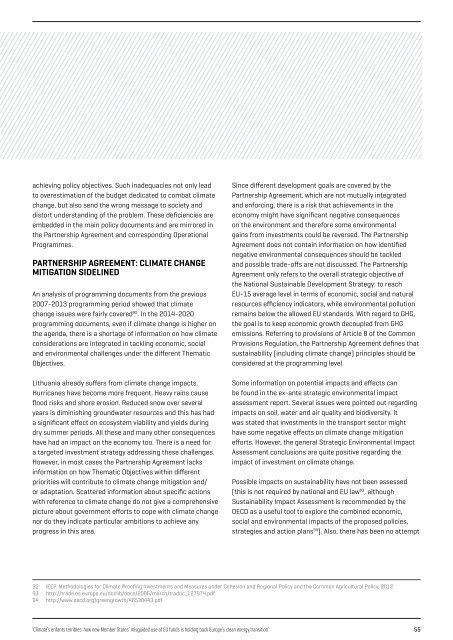ENFANTS TERRIBLES
enfants-terribles
enfants-terribles
Create successful ePaper yourself
Turn your PDF publications into a flip-book with our unique Google optimized e-Paper software.
achieving policy objectives. Such inadequacies not only lead<br />
to overestimation of the budget dedicated to combat climate<br />
change, but also send the wrong message to society and<br />
distort understanding of the problem. These deficiencies are<br />
embedded in the main policy documents and are mirrored in<br />
the Partnership Agreement and corresponding Operational<br />
Programmes.<br />
PARTNERSHIP AGREEMENT: CLIMATE CHANGE<br />
MITIGATION SIDELINED<br />
An analysis of programming documents from the previous<br />
2007-2013 programming period showed that climate<br />
change issues were fairly covered 92 . In the 2014-2020<br />
programming documents, even if climate change is higher on<br />
the agenda, there is a shortage of information on how climate<br />
considerations are integrated in tackling economic, social<br />
and environmental challenges under the different Thematic<br />
Objectives.<br />
Lithuania already suffers from climate change impacts.<br />
Hurricanes have become more frequent. Heavy rains cause<br />
flood risks and shore erosion. Reduced snow over several<br />
years is diminishing groundwater resources and this has had<br />
a significant effect on ecosystem viability and yields during<br />
dry summer periods. All these and many other consequences<br />
have had an impact on the economy too. There is a need for<br />
a targeted investment strategy addressing these challenges.<br />
However, in most cases the Partnership Agreement lacks<br />
information on how Thematic Objectives within different<br />
priorities will contribute to climate change mitigation and/<br />
or adaptation. Scattered information about specific actions<br />
with reference to climate change do not give a comprehensive<br />
picture about government efforts to cope with climate change<br />
nor do they indicate particular ambitions to achieve any<br />
progress in this area.<br />
Since different development goals are covered by the<br />
Partnership Agreement, which are not mutually integrated<br />
and enforcing, there is a risk that achievements in the<br />
economy might have significant negative consequences<br />
on the environment and therefore some environmental<br />
gains from investments could be reversed. The Partnership<br />
Agreement does not contain information on how identified<br />
negative environmental consequences should be tackled<br />
and possible trade-offs are not discussed. The Partnership<br />
Agreement only refers to the overall strategic objective of<br />
the National Sustainable Development Strategy: to reach<br />
EU-15 average level in terms of economic, social and natural<br />
resources efficiency indicators, while environmental pollution<br />
remains below the allowed EU standards. With regard to GHG,<br />
the goal is to keep economic growth decoupled from GHG<br />
emissions. Referring to provisions of Article 8 of the Common<br />
Provisions Regulation, the Partnership Agreement defines that<br />
sustainability (including climate change) principles should be<br />
considered at the programming level.<br />
Some information on potential impacts and effects can<br />
be found in the ex-ante strategic environmental impact<br />
assessment report. Several issues were pointed out regarding<br />
impacts on soil, water and air quality and biodiversity. It<br />
was stated that investments in the transport sector might<br />
have some negative effects on climate change mitigation<br />
efforts. However, the general Strategic Environmental Impact<br />
Assessment conclusions are quite positive regarding the<br />
impact of investment on climate change.<br />
Possible impacts on sustainability have not been assessed<br />
(this is not required by national and EU law 93 , although<br />
Sustainability Impact Assessment is recommended by the<br />
OECD as a useful tool to explore the combined economic,<br />
social and environmental impacts of the proposed policies,<br />
strategies and action plans 94 ). Also, there has been no attempt<br />
92<br />
93<br />
94<br />
IEEP. Methodologies for Climate Proofing Investments and Measures under Cohesion and Regional Policy and the Common Agricultural Policy, 2012<br />
http://trade.ec.europa.eu/doclib/docs/2006/march/tradoc_127974.pdf<br />
http://www.oecd.org/greengrowth/46530443.pdf<br />
‘Climate’s enfants terribles: how new Member States’ misguided use of EU funds is holding back Europe’s clean energy transition’ 55


